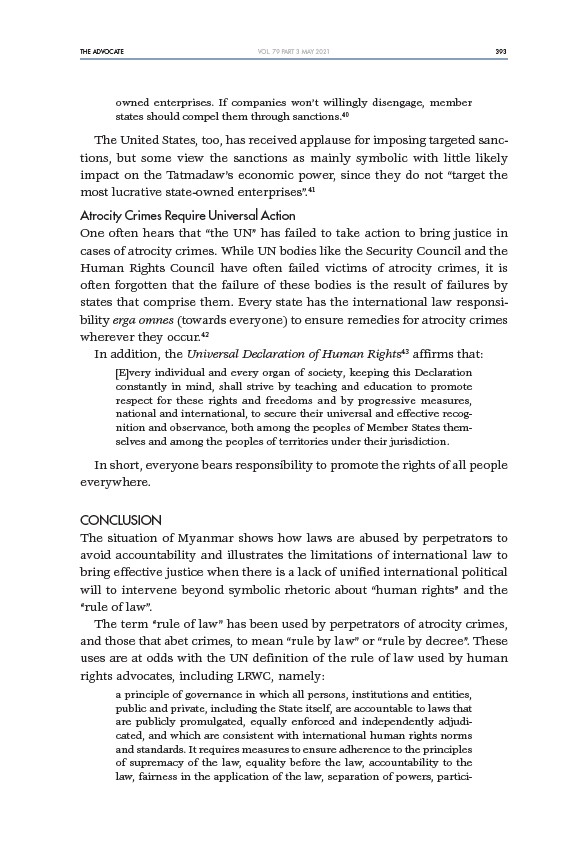
THE ADVOCATE 393
VOL. 79 PART 3 MAY 2021
owned enterprises. If companies won’t willingly disengage, member
states should compel them through sanctions.40
The United States, too, has received applause for imposing targeted sanctions,
but some view the sanctions as mainly symbolic with little likely
impact on the Tatmadaw’s economic power, since they do not “target the
most lucrative state-owned enterprises”.41
Atrocity Crimes Require Universal Action
One often hears that “the UN” has failed to take action to bring justice in
cases of atrocity crimes. While UN bodies like the Security Council and the
Human Rights Council have often failed victims of atrocity crimes, it is
often forgotten that the failure of these bodies is the result of failures by
states that comprise them. Every state has the international law responsibility
erga omnes (towards everyone) to ensure remedies for atrocity crimes
wherever they occur.42
In addition, the Universal Declaration of Human Rights43 affirms that:
Every individual and every organ of society, keeping this Declaration
constantly in mind, shall strive by teaching and education to promote
respect for these rights and freedoms and by progressive measures,
national and international, to secure their universal and effective recognition
and observance, both among the peoples of Member States themselves
and among the peoples of territories under their jurisdiction.
In short, everyone bears responsibility to promote the rights of all people
everywhere.
CONCLUSION
The situation of Myanmar shows how laws are abused by perpetrators to
avoid accountability and illustrates the limitations of international law to
bring effective justice when there is a lack of unified international political
will to intervene beyond symbolic rhetoric about “human rights” and the
“rule of law”.
The term “rule of law” has been used by perpetrators of atrocity crimes,
and those that abet crimes, to mean “rule by law” or “rule by decree”. These
uses are at odds with the UN definition of the rule of law used by human
rights advocates, including LRWC, namely:
a principle of governance in which all persons, institutions and entities,
public and private, including the State itself, are accountable to laws that
are publicly promulgated, equally enforced and independently adjudicated,
and which are consistent with international human rights norms
and standards. It requires measures to ensure adherence to the principles
of supremacy of the law, equality before the law, accountability to the
law, fairness in the application of the law, separation of powers, partici-